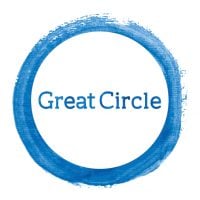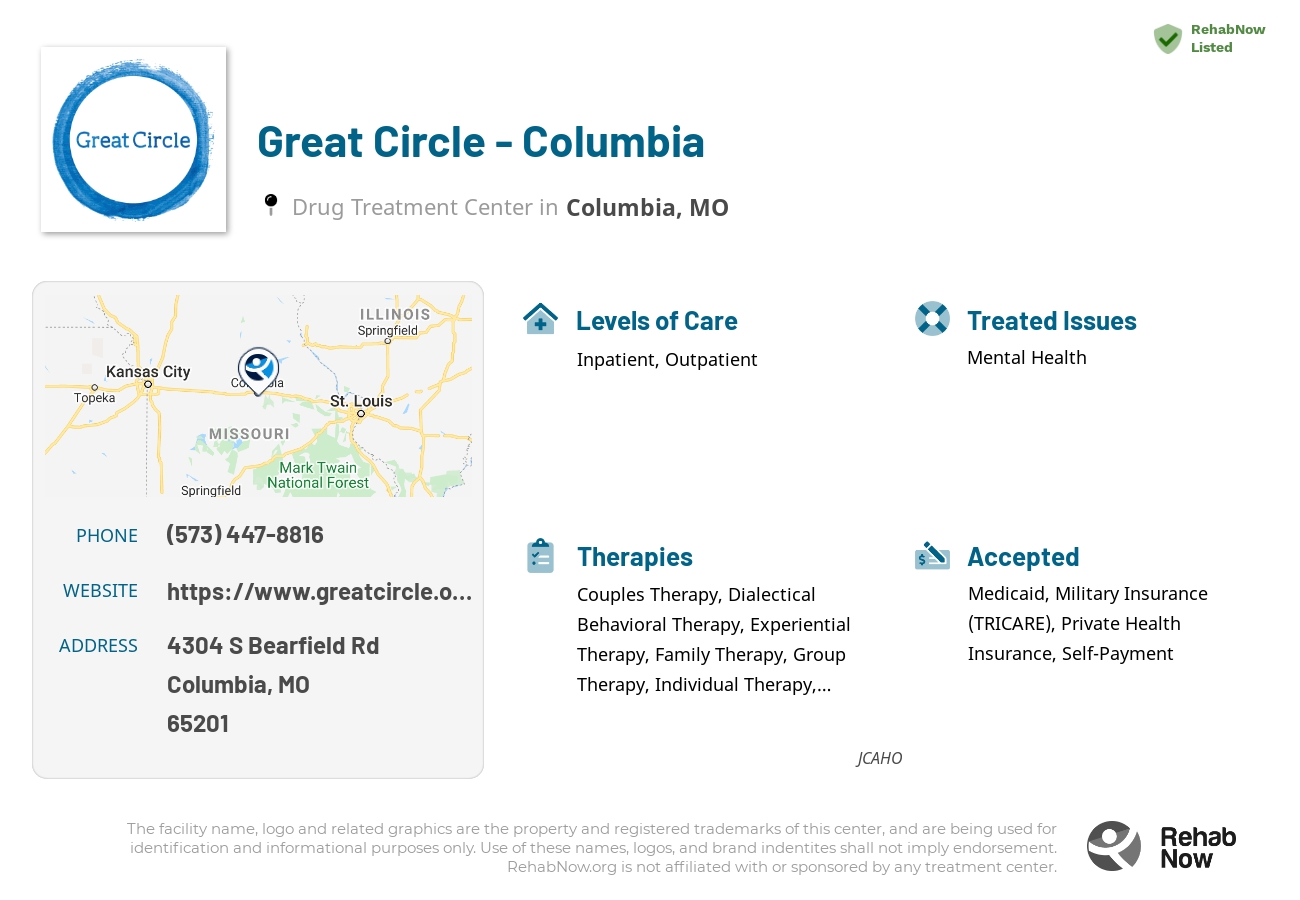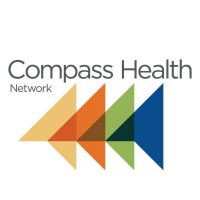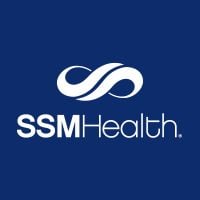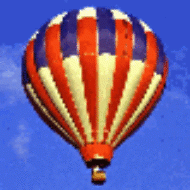Great Circle - Columbia
Drug Rehab Center in Columbia, Missouri
Columbia Great Circle is an accredited addiction treatment center providing compassionate and comprehensive support for people struggling with substance abuse, drug addiction and alcoholism, offering both inpatient and outpatient levels of care which include evidence-based counseling sessions such as individual therapy and group therapy to help clients achieve lasting recovery.
About Great Circle - Columbia in Missouri
Located in Columbia, MO, KVC Missouri, formerly known as Great Circle, is dedicated to strengthening families through a variety of services, including mental health support and foster care. This nonprofit facility stands out for offering a comprehensive continuum of care to address the unique needs of children and families in crisis.
- Comprehensive Mental Health Support: KVC Missouri provides a full range of mental health services, including assessments, therapy, and counseling.
- Foster Care and Family Reunification Services: Offers foster care with a focus on providing safe environments and working towards reunification or adoption.
- Intensive Residential Drug Rehab: Specialized programs deliver intensive care and support for children facing significant mental health challenges.
Accredited by the Joint Commission on Accreditation of Healthcare Organizations (JCAHO), KVC Missouri ensures high-quality care across its varied services. The facility’s emphasis on tailored care and community involvement highlights its commitment to family and child welfare.
Specializing in mental health disorders, substance abuse, drug addiction, and alcoholism, KVC Missouri addresses a range of addictions and issues through both inpatient and outpatient care. Their treatment methods include individual and group therapy sessions, medication-assisted treatment, and specialized programs for co-occurring mental health disorders.
Genders
Ages
Modality
Additional
Accreditations

JCAHO
Conditions and Issues Treated
Levels of Care Offered
This center offers a variety of custom treatment tailored to individual recovery. Currently available are Inpatient, Outpatient, with additional therapies available as listed below.
Inpatient recovery offers individual therapy, groups, and family therapy. The length of inpatient addiction treatment depends on the addict and their addiction. Inpatient rehab is a costly drug treatment, costing anywhere from $30k- to $60k. However, insurance often offers help in covering these costs.
Outpatient treatment can be considered the lowest intensity level of addiction treatment in Columbia, MO. It is ideal for early phase addiction or lower intensity addictions. Great Circle - Columbia peer group support, 12-step programs, and individual counseling are likely to be involved.
Therapies & Programs
Individual therapy is ideal for addicts who want to focus on themselves. It can also be helpful for those whose withdrawal symptoms are exacerbated by the presence of other people.
Benefits of individual therapy are:
- Access to a personalized treatment plan that focuses on the individual needs of the addict
- More privacy during treatment sessions
- Better personal development through introspection
- Increased self-awareness regarding addictive tendencies in order to avoid relapse
- Greater potential for a long-term recovery plan
- Receiving professional advice and detox assistance from medical staff
Couples therapy is a treatment method used to help couples in which at least one member of the couple has a drug addiction. Couples therapy can be used whether the addicted partner is using drugs or in recovery. An additional benefit of couples therapy is that it can help make other types of treatment, such as 12-step programs, more effective.
Family therapy can help you and your family deal with old issues that may trigger substance abuse. The idea behind family therapy for drug addiction is that you are never fully healed from substance abuse until you’ve healed your relationship with your family, too. To get sober, you need to find a different way to cope with the pain in your life.
This is when a group of people in various stages of recovery meet up and discuss their experiences, triggers, successes, failures, and even alternative therapies! Unlike support groups where everyone already knows each other, group therapy is conducted along side outpatient or inpatient treatment at Great Circle - Columbia.
Trauma therapy is a clinical process that helps individuals deal with mental stress often caused by traumatic events. The therapist helps the person identify, understand and work through the problem. This is done with the help of talking about it in group or one-on-one counseling sessions.
Therapists use relaxation, role-playing, art, and music to help the person open up about what is bothering them. Some examples include:
- Talking about the traumatic event and how it affected them.
- Helping those who have PTSD to deal with their nightmares and recurring memories.
- Working with individuals to resolve the issues triggering the stress, whether seeing someone who reminds them of what happened or feeling helpless.
The individual is also encouraged to help others that are struggling with similar problems. This often helps them feel empowered and gives them hope.
Trauma therapy is not for everyone; it is usually reserved for people who have recently experienced a traumatic event and struggle to get over it. It is generally done for children, teenage victims of sexual assault, and war veterans.
Dialectical Behavior Therapy (DBT) is used by drug treatment centers across the United States to help drug addicts become sober. DBT is a type of Cognitive Behavioral Therapy (CBT) that combines traditional behavioral treatments with elements from DBT, including dialectics, distress tolerance, and interlocking issues. Some of the negative behaviors associated with addiction, such as impulsivity and mood swings, are addressed in DBT, while others like craving and isolation are not. It is commonly used to treat Borderline Personality Disorder (BPD) along with substance abuse disorders.
The four DBT modules are mindfulness, interpersonal effectiveness, emotion regulation, and distress tolerance:
- Mindfulness helps recovering addicts learn to identify and experience their emotions while realizing that they are not permanent.
- Interpersonal Effectiveness includes assertiveness, asking for what you need, and saying no while improving communication skills.
- Distress Tolerance has recovering addicts learn how to tolerate distress at the moment and avoid resorting to substance abuse.
- Emotion Regulation is used to identify, express and change emotions.
CBT is a psychotherapy approach and method. [ws-nap-name] people to examine how their thoughts, including habitual harmful and inaccurate thinking, affect their actions. CBT is based on the idea that rigid, inflexible thinking leads to poor stress management, which leads to emotional distress.
Similarly, CBT helps people identify and change negative behaviors. It makes you question your perceptions and ask if they are realistic. CBT asks people to examine their behaviors and emotional responses and how they affect their lives. CBT aims to change people’s thinking and behavior to lead a more balanced and healthy life.
Moreover, CBT has been shown to reduce anxiety disorders, depression, and symptoms associated with harmful thoughts or actions.
Patient Experience
Experiential Therapy at Great Circle - Columbia
Experiential Therapy is a type of therapy that involves activity to recreate situations that may have caused trauma or negative emotions. Experiential therapy at Great Circle - Columbia in Columbia, MO can involve acting, props, arts and crafts, animal care or other tools that may be effective. This therapy is done on an individual basis and can help revisit and heal from past traumas. Trust between the therapist and individual is important for success. Experiential therapy can help you more closely become you and move through life positively and authentically.
Payment Options Accepted
For specific insurance or payment methods please contact us.
Is your insurance accepted?
Ask an expert, call (888) 674-0062
Great Circle Associated Centers
Discover treatment facilities under the same provider.
Learn More About Great Circle Centers
Additional Details
Specifics, location, and helpful extra information.
Columbia, Missouri 65201 Phone Number(573) 447-8816 Meta DetailsUpdated April 15, 2024
Staff Verified
Great Circle - Columbia Patient Reviews
There are no reviews yet. Be the first one to write one.
Columbia, Missouri Addiction Information
Opioid-related overdoses in Missouri have been increasing steadily for the past three decades. In 2018, more than 1,130 people in Missouri died from opioid abuse. Methamphetamines and marijuana abuse have surpassed opioid abuse in Missouri. Missouri is the number 1 methamphetamine manufacturer in the country with more than 27 meth labs per 100,000 people.
In 2018, there were reports of 1,817 drug-related overdoses in Columbia, MO. This is a significant increase from the previous year when there were only 1,063 overdoses reported. 30% of Columbia's population admit to using drugs in the past month. Columbia is also home to one of the state's largest heroin treatment centers. In 2016, the center treated nearly 1,000 people for heroin addiction.
Treatment in Nearby Cities
- Chesterfield, MO (94.6 mi.)
- Macon, MO (58.9 mi.)
- Canton, MO (69.7 mi.)
- Mount Vernon, MO (149.2 mi.)
- Lees Summit, MO (111.8 mi.)
Centers near Great Circle - Columbia
The facility name, logo and brand are the property and registered trademarks of Great Circle - Columbia, and are being used for identification and informational purposes only. Use of these names, logos and brands shall not imply endorsement. RehabNow.org is not affiliated with or sponsored by Great Circle - Columbia.
